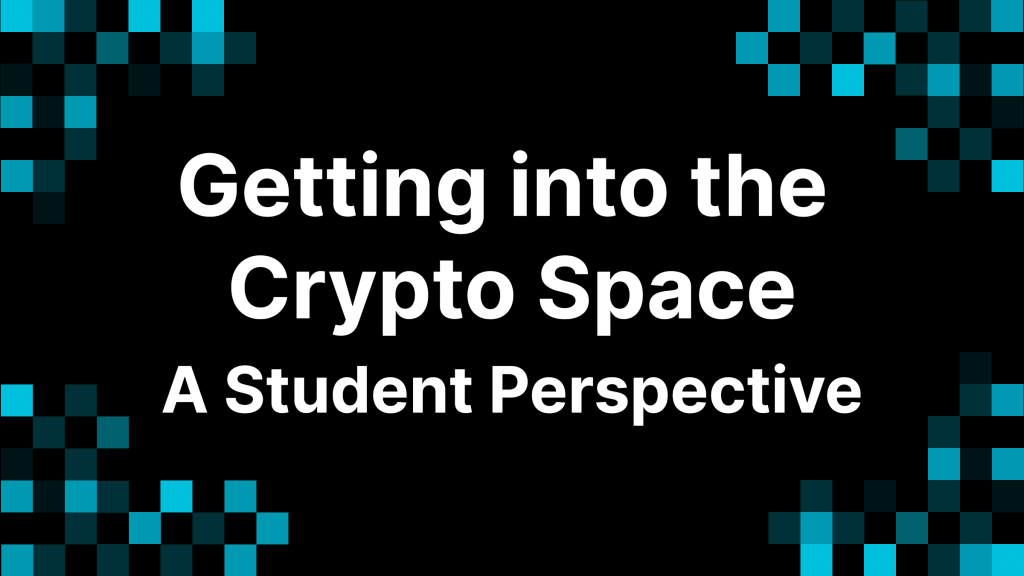Getting Into the Crypto Space: A Student Perspective


How many people don’t want more control of their own money? How many people can be dependent upon themselves to own their own funds and finances? Well, enter decentralization.
Two weeks ago I was an absolute newbie to the crypto world to the extent that the only thing I was aware of was that Bitcoin existed. I knew nothing more than that. Nothing about decentralized finance, blockchain, or any of the tools embedded within those focuses. Fast forward, and entering crypto has been the best thing I’ve done for my own interest and development as a student starting a career in this space. It will give me a great opportunity to grow my knowledge in cutting edge technology as it begins to grow.
Background to Get into Crypto: What I Have Seen So Far
Guess what? In this world, nobody has a background. The “résumé” to join a Guild or participate in an open-source Ecosystem like NEAR (and the rest of the crypto universe for that matter) answers the questions:
1. Do you have some sort of skill, at all?
2. Are you willing to learn a vast number of other skills (the most important being how to teach yourself)?
3. If you’ve been in this space before, how long?
4. Are you willing to keep trying, engaging and working with others to advance the goals of the community?
Nothing else matters—not age, years of experience, whether you went to the best school, or any school at all, or how many groundbreaking applications you’ve built. You don’t have to retake college entrance exams to get a job in this cyberspace, and you surely don’t have to have every possible answer floating around. That is an exciting breath of fresh air for students and software engineers like myself, who are interested in participating in projects that we find meaningful and collaborative and that will someday have a lasting impact for the larger world.
The Basics of the Crypto World: Getting Started
The first thing I learned with respect to this cyberspace is that nothing is set in stone. Things change everyday, and the use cases to all of these tools are absolutely endless. For example, let’s imagine a world where there exists multiple currencies that are not bound by a location. These currencies belong to the world. Sure some currencies may be best for certain situations, but anything would work. With respect to that, the BTC, ETH, XRP, LTC, etc. belong only to the individual when they keep it in their own wallet.
The currency is never owned by a bank or any other third party—the currency takes its turn with each individual and never anybody else. With that, each person must understand that his/her money exists on the blockchain. Any action is final. Send to the wrong address, and the currency is gone. In parallel to the sense of personal ownership, the entire space is truly committed to being open sourced. So not only is value distributed independently, but data is also used openly.
Decentralization
Understanding the idea of decentralization is key to grasping the underlying value proposition of blockchain technology. This is what NEAR is working towards for their ecosystem, but with the added value of having easy to use applications and a generally scalable protocol. From what I can see to date, decentralization is all about opening up access, ownership, and power: decentralizing apps for things like finance allow for more autonomy by individuals while also removing barriers to entry. There is no central person, company, or companies to control the finances or, in the case of NEAR, the open web. From this, we could see serious advances in fields like gaming where efficiency, digitally scarce items, and cryptocurrency integrations are top priorities that may one day be seamless and standard for all games.
What Lies Ahead
Given that this new currency has no “homeland,” think about global betting markets (on Flux?) or maybe a new stock market. What about fully decentralized finance (DeFi)?Put a couple of these together and you have a fully operational stock market on a DeFi system. What about all the other applications of these things? The possibilities truly are endless. Many of these ideas only look at the intersection of finance and crypto. What if we look at something like a decentralized and open web? Here at NEAR, we are using this to solve the problems that arise when people start to scale applications that relate to data, privacy, gaming, digital assets, marketplaces of the future, and much, much more.
Using NEAR protocol, these opportunities are made possible using advanced technologies like sharding for parallel computation in unison with a user-friendly account model. Pretty cool if you ask a Gen Z’er like me looking at what the next 20 years of my life and career might look like.
Advice To Fellow Students and Developers:
Get into this world….yesterday. As companies begin to understand the advantages to blockchain, DeFi, and NFTs, they will migrate quickly. At that point, blockchain and crypto will blow up. The thing to understand is that this newfound technological journey will not be a lonely road. As I’ve experienced at NEAR and through other contacts, people are more than willing to help you through this space and answer all the questions you may have. I, for example, have accepted this world in stride and feel like I am beginning to find a grasp on the surface of crypto and the general cyberspace in only 2 weeks. The learning curve is high, but the space is never boring. Learn everything you can…the rabbit hole is very deep and growing faster than ever.




